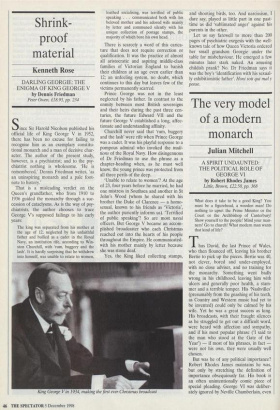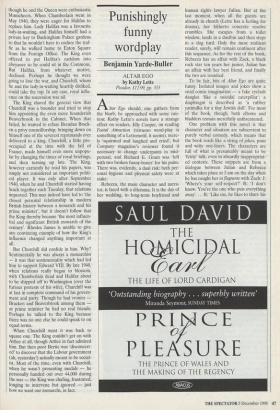The very model of a modern monarch
Julian Mitchell
A SPIRIT UNDAUNTED: THE POLITICAL ROLE OF GEORGE VI by Robert Rhodes James Little, Brown, £22.50, pp. 368
What does it take to be a good King? You must be a figurehead, a wooden man! Do nothing to upset the Prime Minister or the Court or the Archbishop of Canterbury! Show yourself to the people! Mind your man- ners! Go to church! What modern man wants that kind of life?
Thus David, the last Prince of Wales, who then flounced off, leaving his brother Bertie to pick up the pieces. Bertie was 40, not clever, bored and under-employed, with no close adviser, and no training for the monarchy. Something went badly wrong in his childhood, leaving him with ulcers and generally poor health, a stam- mer and a terrible temper. His Nashvilles' (presumably from the gnashing of his teeth, as Country and Western music had yet to be invented) could only be calmed by his wife. Yet he was a great success as king. His broadcasts, with their fraught silences as he struggled to get out a difficult word, were heard with affection and sympathy, and if his most popular phrase CI said to the man who stood at the Gate of the Year') — if most of his phrases, in fact were not his own, they were usually well chosen.
But was he of any political importance? Robert Rhodes James maintains he was, but only by stretching the definition of importance obsequiously far. His book is an often unintentionally comic piece of special pleading. George VI was deliber- ately ignored by Neville Chamberlain, even though he and the Queen were enthusiastic Municheers. When Chamberlain went in May 1940, they were eager for Halifax to replace him. Lady Halifax was a favourite lady-in-waiting, and Halifax himself had a private key to Buckingham Palace gardens so that he wouldn't have to endure the traf- fic as he walked home to Eaton Square from the Foreign Office. The King even offered to put Halifax's earldom into abeyance so he could sit in the Commons. But Halifax, from whatever motive, declined. Perhaps he thought we were going to lose the war, and Churchill, whom he and the lady-in-waiting heartily disliked, could take the rap. In any case, royal influ- ence on the succession was nil.
The King shared the general view that Churchill was a bounder and tried to stop him appointing the even more bounderish Beaverbrook to the Cabinet. When that failed, he wanted to refuse Brendan Brack- en a privy councillorship, bringing down on himself one of the severest reprimands ever delivered to a king. Churchill, a little pre- occupied at the time with the fall of France, made himself even more unpopu- lar by changing the times of royal briefings, and then turning up late. The King, however earnestly he read his papers, was simply not considered an important politi- cal player. It was only after September 1940, when he and Churchill started having lunch together each Tuesday, that relations improved. This may indeed have led to 'the closest personal relationship in modern British history between a monarch and his prime minister', but it doesn't follow that the King thereby became 'the most influen- tial and significant British monarch of the century'. Rhodes James is unable to give any convincing example of how the King's influence changed anything important at all.
But Churchill did confide in him. Why? Sentimentally he was always a monarchist — it was that sentimentality which had led him to support Edward VIII. By late 1940, when relations really began to blossom, with Chamberlain dead and Halifax about to be shipped off to Washington (over the furious protests of his wife), Churchill was at last in complete command of his govern- ment and party. Though he had cronies Bracken and Beaverbrook among them as prime minister he had no real friends. Perhaps he talked to the King because there was no one else he could speak to on equal terms.
When Churchill went it was back to square one. The King couldn't get on with Attlee at all, though Attlee in fact admired him. But then poor Bertie was 'disconcert- ed' to discover that the Labour government (ah, yesterday!) actually meant to be social- ist. Most of the time, even with Churchill, when he wasn't presenting medals — he personally handed out over 44,000 during the war — the King was chafing, frustrated, longing to intervene but ignored — just how we want our monarchs, in fact.



















































































 Previous page
Previous page